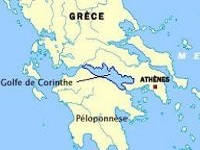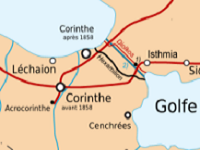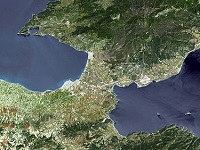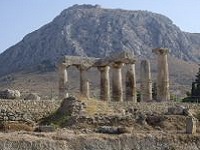During his missionary career, Paul always sought out large cities. He knew that in cities battles of the mind were decided. Whoever prevailed in Corinth had entry into all of Greece. If anything was known about Christ in this busy port, it was only a matter of time until the surrounding islands and towns were also informed.
___________________________________________________________
34. Corinth, the city between two seas
After the failure of Athens, Paul moved to Corinth and remained for 18 months in this port city. We are in the year 50. Archaeological research has allowed us to better understand this multicultural city. Destroyed during the Roman invasion in 146 BC., the former capital of the Achaean League remained deserted for a hundred years. In the year 44 BC. - a century before the arrival of the apostle - Julius Caesar had Corinth rebuilt, which he populated mainly with freedmen (ex-slaves). The city then became rich thanks to its commercial activities and its two ports open to two seas.

The strategic position of Corinth on the isthmus at the entrance to the Peloponnese made it the most prosperous city in the country

Corinth had two seaports. The port of Cenchrea overlooked the Aegean Sea and the port of Lechaion (Léchaion) overlooked the Ionian Sea.

The Isthmus of Corinth seen from a plane
Occupying a strategic position on the six-kilometer-wide isthmus, which joins northern Greece to the Peloponnese peninsula and separating the Ionian Sea from the Aegean Sea, it was, in Paul's time, a major trading city, with a working population. It was also the crossroads of the East-West axis which allowed the arrival of luxury goods from the East. The port of Cenchrea overlooked the Aegean Sea and the port of Lechea overlooked the Ionian Sea. The Acrocorinth dominated the city and housed the temple of Aphrodite. During his missionary career, Paul always sought out large cities. He knew that in cities battles of the mind were decided. Whoever prevailed in Corinth had entry into all of Greece. If anything was known about Christ in this busy port, it was only a matter of time until the surrounding islands and towns were also informed. Corinth was inhabited by a very cosmopolitan population, without narrow national pride. In this it was comparable to Antioch in Syria. All opinions had a place in Corinth and in this fertile ground, the seed of the Gospel could easily germinate. (Acts 18, 1-17) We can get a good idea of the contrast between Athens and Corinth in Paul's time. Athens was like a medieval university town, filled with the shouts and songs of students. Corinth looked like a teeming anthill, a buzzing hive of traders from all corners of the earth, eager to make their fortune. The transit of goods through its ports is at the origin of its economic power. A large number of boats came out of its shipyards. The ports of Cenchrea and Lechaion had invented the three-row galley. Carpets, fabrics, fabrics of all kinds came out of his workshops. Its bronze breastplates were the best in the West. On the fertile lands of the region, thousands of slaves grew wheat, vegetables and fruits in abundance and cultivated the vines from which the famous Corinthian wine was made. Paul will find there no aristocracy of old stock but a large number of nouveau riche and heirs of enriched pioneers: “Consider, brothers, who you are, you who have received the call of God: there is among you neither many who are wise in the eyes of men, nor many mighty, nor many of good family.” An unenviable situation that he immediately rectifies by explaining the advantages that can be gained from it: “What is weak in the world, God has chosen to confuse what is strong.” (1 Cor 1, 26-27)

6 km paved road where slaves pulled boats from one sea to another
As mentioned above, the two ports of Corinth are separated by an isthmus six kilometers wide: if one wants to go by sea from one port to another, one must bypass the entire Peloponnese, which results in a very costly waste of time. Ingenious leaders had the idea of building a paved route on the isthmus in order to tow commercial ships between the two gulfs. The lighter ones were transported on carts, the heavier ones were placed on cylinders. It took two days, sometimes three, for hundreds of slaves to push and pull them to the other side. Nero had intended to pierce the Isthmus and build a canal, but this gigantic feat would not be achieved until 19 centuries later (1881-1893).

Remains of the opulent city... the temple of Apollo and, in the distance, the fortress of Acrocorinth which housed the temple of Aphrodite where hundreds of courtesans practiced sacred prostitution
Corinth, where prostitution and debauchery reigned, attracted rich travelers, foreigners, soldiers, sailors, traders and captains. They were robbed of their money, ruining their health and spreading “Corinthian disease” throughout all regions of the Empire. A famous proverb said: "Not everyone can go to Corinth", which reminds us that the pleasures of Corinth were expensive, and that many abstained from them for lack of money. A “Corinthian girl” simply referred to a prostitute. Paul had Corinth before his eyes when he painted the dark picture of paganism where all the excesses are brought to light. And yet, he loved this city where he did not find the pride of Athens. Nowhere in his missionary career did Paul have to fight so violently against all kinds of dangerous tendencies as in Corinth. Due to its geographical position, Corinth was at the gates of Italy. From its port of Lechaion, we embarked directly for Brindisi from where we went up the Via Appia to Rome.
___________________________________________________________
34. Corinth, the city between two seas
After the failure of Athens, Paul moved to Corinth and remained for 18 months in this port city. We are in the year 50. Archaeological research has allowed us to better understand this multicultural city. Destroyed during the Roman invasion in 146 BC., the former capital of the Achaean League remained deserted for a hundred years. In the year 44 BC. - a century before the arrival of the apostle - Julius Caesar had Corinth rebuilt, which he populated mainly with freedmen (ex-slaves). The city then became rich thanks to its commercial activities and its two ports open to two seas.
The strategic position of Corinth on the isthmus at the entrance to the Peloponnese made it the most prosperous city in the country
Corinth had two seaports. The port of Cenchrea overlooked the Aegean Sea and the port of Lechaion (Léchaion) overlooked the Ionian Sea.
The Isthmus of Corinth seen from a plane
Occupying a strategic position on the six-kilometer-wide isthmus, which joins northern Greece to the Peloponnese peninsula and separating the Ionian Sea from the Aegean Sea, it was, in Paul's time, a major trading city, with a working population. It was also the crossroads of the East-West axis which allowed the arrival of luxury goods from the East. The port of Cenchrea overlooked the Aegean Sea and the port of Lechea overlooked the Ionian Sea. The Acrocorinth dominated the city and housed the temple of Aphrodite. During his missionary career, Paul always sought out large cities. He knew that in cities battles of the mind were decided. Whoever prevailed in Corinth had entry into all of Greece. If anything was known about Christ in this busy port, it was only a matter of time until the surrounding islands and towns were also informed. Corinth was inhabited by a very cosmopolitan population, without narrow national pride. In this it was comparable to Antioch in Syria. All opinions had a place in Corinth and in this fertile ground, the seed of the Gospel could easily germinate. (Acts 18, 1-17) We can get a good idea of the contrast between Athens and Corinth in Paul's time. Athens was like a medieval university town, filled with the shouts and songs of students. Corinth looked like a teeming anthill, a buzzing hive of traders from all corners of the earth, eager to make their fortune. The transit of goods through its ports is at the origin of its economic power. A large number of boats came out of its shipyards. The ports of Cenchrea and Lechaion had invented the three-row galley. Carpets, fabrics, fabrics of all kinds came out of his workshops. Its bronze breastplates were the best in the West. On the fertile lands of the region, thousands of slaves grew wheat, vegetables and fruits in abundance and cultivated the vines from which the famous Corinthian wine was made. Paul will find there no aristocracy of old stock but a large number of nouveau riche and heirs of enriched pioneers: “Consider, brothers, who you are, you who have received the call of God: there is among you neither many who are wise in the eyes of men, nor many mighty, nor many of good family.” An unenviable situation that he immediately rectifies by explaining the advantages that can be gained from it: “What is weak in the world, God has chosen to confuse what is strong.” (1 Cor 1, 26-27)
6 km paved road where slaves pulled boats from one sea to another
As mentioned above, the two ports of Corinth are separated by an isthmus six kilometers wide: if one wants to go by sea from one port to another, one must bypass the entire Peloponnese, which results in a very costly waste of time. Ingenious leaders had the idea of building a paved route on the isthmus in order to tow commercial ships between the two gulfs. The lighter ones were transported on carts, the heavier ones were placed on cylinders. It took two days, sometimes three, for hundreds of slaves to push and pull them to the other side. Nero had intended to pierce the Isthmus and build a canal, but this gigantic feat would not be achieved until 19 centuries later (1881-1893).
Remains of the opulent city... the temple of Apollo and, in the distance, the fortress of Acrocorinth which housed the temple of Aphrodite where hundreds of courtesans practiced sacred prostitution
Corinth, where prostitution and debauchery reigned, attracted rich travelers, foreigners, soldiers, sailors, traders and captains. They were robbed of their money, ruining their health and spreading “Corinthian disease” throughout all regions of the Empire. A famous proverb said: "Not everyone can go to Corinth", which reminds us that the pleasures of Corinth were expensive, and that many abstained from them for lack of money. A “Corinthian girl” simply referred to a prostitute. Paul had Corinth before his eyes when he painted the dark picture of paganism where all the excesses are brought to light. And yet, he loved this city where he did not find the pride of Athens. Nowhere in his missionary career did Paul have to fight so violently against all kinds of dangerous tendencies as in Corinth. Due to its geographical position, Corinth was at the gates of Italy. From its port of Lechaion, we embarked directly for Brindisi from where we went up the Via Appia to Rome.